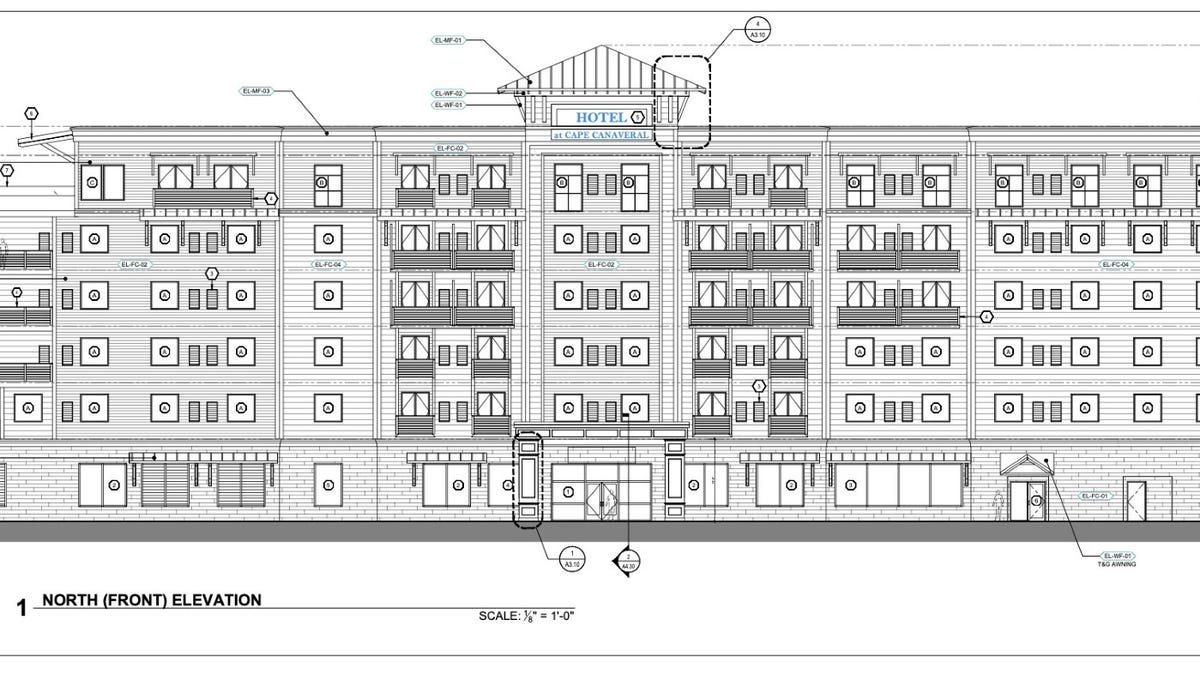Hotels & Accommodations
Cape Canaveral to get six-story Margaritaville-branded hotel

Construction of a Margaritaville-branded hotel is about to begin in Cape Canaveral, aiming to attract customers from Port Canaveral’s steadily growing cruise market.
The 150-room, six-story Compass by Margaritaville Hotel will be located at 8955 Columbia Road, which is one of the closest parcels to Port Canaveral.
Corey Runte, a vice president at Certified General Contractors, which will be coordinating the $32 million project, said construction could begin as early as October.
“I think it’s a unique brand,” Runte said, noting its connection to the late singer/songwriter Jimmy Buffett, whose hit song “Margaritaville” helped trigger the creation of a Margaritaville hospitality empire of hotels, restaurants and other venues.
Coincidentally, the Cape Canaveral hotel will be just off State Road A1A, which last year was officially designated by the state as the Jimmy Buffett Memorial Highway.
Runte said hotel will have indoor and outdoor dining, plus a resort-style swimming pool.
Cape Canaveral hotel development continues
This will be the third hotel that Certified General Contractors will be building in Cape Canaveral recently, joining the 150-room Hyatt Place Cape Canaveral that opened earlier this year and the soon-to-open, 156-room Hilton Garden Inn Cape Canaveral.
Brevard County Tourist Development Council Chair Rob Feltner said the construction of hotels the Cape Canaveral market is an indication of the optimism about the continued growth of the cruise business at Port Canaveral, the world’s second-busiest cruise port.
Many Port Canaveral passengers stay in hotels along the Space Coast for one or more days before or after their cruises.
There are several other Compass by Margaritaville hotels in Florida, including ones in Anna Maria Sound, Flagler Beach and Naples.
Runte said the brand typically approves projects in cities near the water and in a tourist-heavy community.
“They’re very selective with where they’ll approve a location,” Runte said.
An Alachua-based management group will be the Cape Canaveral hotel’s owner/developer, under the Compass by Margaritaville franchise.
Another Margaritaville hotel was proposed in Melbourne
Principals in the Cape Canaveral hotel are not connected with a proposed Compass by Margaritaville on a 4.6-acre riverfront site just south of Cherry Street on U.S. 1 in Melbourne.
The Melbourne proposed is more elaborate than the Cape Canaveral project, with plans for the tropical-themed Melbourne Margaritaville that include a seven-story hotel facing the Indian River Lagoon; a two-story restaurant building with 400 seats; a 221-slip marina; a 14,000-square-foot lawn with stage for concerts and events; a four-level parking garage; and a public boardwalk.
However, construction on that project has not proceeded.
The Melbourne project’s developer did not respond to phone, text and email messages seeking an update on the status of the development.
Melbourne city officials say they have not received any recent updates on that project.
Dave Berman is business editor at FLORIDA TODAY. Contact Berman at dberman@floridatoday.com, on X at @bydaveberman and on Facebook at www.facebook.com/dave.berman.54
Hotels & Accommodations
Targeted by the right, Britain’s asylum hotels are places of fear and disorder. Bad political decisions made it so | Daniel Trilling

A broad section of Britain’s right has spent the summer behaving as if it would like a repeat of last year’s racist riots. As politicians and commentators cry “tinderbox Britain” – are they warning us, or willing it on? – far-right extremists have been actively trying to stoke violence. This year, they have pinned their hopes on asylum hotels, an issue where public fears over crime, immigration and the welfare state conveniently converge.
In some places, far-right activists have piggybacked on protests prompted by local grievances. The most significant this year was in Epping, Essex, after an alleged sexual assault by an asylum seeker led to demonstrations that turned violent when they were joined by members of various far-right groups. A similar pattern has unfolded in London’s Canary Wharf, after untrue rumours that some of the Epping hotel residents were being moved there. In other cases, far-right activists have themselves organised the protests. A call has gone out among their online networks for gatherings this weekend in several parts of England.
It is unlikely – though not impossible – that the end result will be on the scale of the riots we saw last summer, since that was triggered by a shocking act of murder followed by widespread misinformation and conspiracy theories about the identity of the killer. But anti-fascist campaigners I’ve spoken to believe it may cause lower-level disturbances like those seen in Epping and in Knowsley, Merseyside, in 2023, and it will certainly help ensure that asylum hotels remain a contentious topic for many months to come.
One question, however, often goes unanswered: why are asylum seekers being accommodated in hotels in the first place? Before 2020, the phenomenon hardly existed, yet by its peak in 2023 there were more than 55,000 people in hotels, waiting many months to have their asylum claims processed. (Today the number has dropped to about 30,000.)
For some, the answer will be: “because there are too many people seeking asylum in the UK and we don’t have the resources to support them”. This is misleading. Although Britain has seen higher numbers of asylum applications in recent years, according to Oxford University’s Migration Observatory they are not exceptional when compared with those of other European countries. Yet the UK relies on costly hotel accommodation far more heavily than any of its neighbours.
A series of actions by both Labour and Conservative governments since the turn of the century has brought us to this point. The first was the decision by Tony Blair’s government to make people seeking asylum heavily reliant on state support. Until mid-2002, asylum seekers could take up jobs if they had to wait more than six months for an initial decision on their asylum claim. Much of the press disliked this, saying it allowed asylum seekers to take other people’s jobs. So the government in effect banned them from working. (In many other European countries, people seeking asylum are still allowed to work after a waiting period.)
If a government bans people from working then it needs to provide them with essential support, unless it is happy for them to starve to death on the streets. At first, accommodation was largely provided by local councils’ housing departments. But politicians took a second decision, which was to privatise the accommodation. This began in the late 2000s, but the really important step was taken by David Cameron and Nick Clegg’s coalition government.
In 2012, as part of the coalition’s wider austerity drive, asylum accommodation was outsourced to the same profit-driven contractors that now run many of our public services. The contractors often failed to provide decent housing or value for money and the government had to rewrite the contracts. Even then, problems persisted: by the end of the decade, it was becoming increasingly common to house asylum seekers in “contingency accommodation” such as short-term lets and hotels.
The third decision, taken by the governments of Boris Johnson, Liz Truss and Rishi Sunak, was to sabotage the asylum system itself. During the first Covid lockdown in 2020, people seeking asylum were placed in hotels – which, at the time, were largely empty anyway – for public health reasons. This coincided with a rise in the number of people crossing the Channel by small boat, as opposed to stowing away in lorries as they had largely done previously. (Many people who choose such routes do so because they do not have the option of a safe resettlement scheme, such as the one the UK has offered to Ukrainian refugees.)
The Conservative government encouraged hostility towards small boat journeys, describing them as an “invasion”. Instead of moving asylum seekers out of hotels and into more suitable accommodation when the pandemic subsided, it kept them there while it built prison-like encampments as an alternative. (These schemes mostly never got off the ground.) At the same time, it allowed a backlog of asylum applications to grow – and then tried to ban many asylum seekers from claiming asylum at all, saying it would instead deport them permanently to Rwanda. (That scheme never got off the ground either.)
All the above has led to more asylum seekers living in more hotels for longer, in more parts of the country. At its root, it is a story of public penny-pinching and market forces causing a problem that is then made worse by politicians promising a quick fix or finding a convenient scapegoat. If that sounds familiar then perhaps it’s because it’s a story we also find in our hospitals, schools and wider communities.
This could be an occasion to ask what has gone wrong with the state more generally, and to talk about what could be done to make it work better for everyone. Keir Starmer’s government has promised to end the use of hotels by 2029, by investing in the asylum system and reducing small boat journeys. But if it is unwilling to have that wider conversation, then the right is ready with its own seductive, destructive answers.
Hotels & Accommodations
Minister Satish Sharma inspects Hotels , Establishments

SRINAGAR, Aug 8: In continuation of government’s intensified campaign to ensure food safety and quality standards across Jammu and Kashmir, Minister for Food, Civil Supplies & Consumer Affairs, Satish Sharma, today led a comprehensive inspection drive in various parts of Srinagar. The inspection covered Food Corporation of India (FCI) godowns, fair price shops, hotels, restaurants and street food vendors.
The Minister was accompanied by Director, FCS&CA, Dr. Owais Ahmad, senior officers from the Food Corporation of India, Food Safety Department and Legal Metrology Department. Satish Sharma began his visit at the FCI godowns, where he reviewed the storage infrastructure, stock handling procedures and sanitation standards. He stressed that every stage of grain handling—from unloading to storage to distribution—must strictly adhere to prescribed quality control norms.
There is absolutely no room for negligence. The safety and quality of these supplies is non-negotiable,” he said. He directed the officials to conduct regular internal audits, ensure pest control and proper ventilation and maintain accurate stock records to prevent wastage and pilferage. The Minister then visited multiple fair price shops, where he interacted with shopkeepers and beneficiaries under the Public Distribution System (PDS). He checked stock registers, verified availability of ration and inspected the quality of grains and other commodities. He emphasised the need for complete transparency in distribution and warned that any irregularities in quantity, quality, or pricing will invite immediate suspension of licenses and legal action. Given recent reports and seizures of adulterated and unsafe meat in Kashmir, Satish Sharma carried out surprise inspections of hotels, restaurants and street vendors. These checks focused on meat sourcing, storage conditions, hygiene practices in kitchens and the freshness of raw materials being used. Concerned by the threat such practices pose to public health, the Minister issued a strong warning.“Those involved in the storage, usage, or trade of adulterated meat are putting lives at risk. This is not a minor violation—it is a criminal act. I want to make it absolutely clear: the government will take strict and immediate punitive action against all offenders, including sealing of premises, cancellation of licenses and prosecution under relevant food safety and public health laws.” He also condemned the practice by some violators of dumping spoiled meat in abandoned places to evade penalties, calling it an unacceptable and dangerous tactic that will not shield them from legal consequences.
Satish Sharma directed the enforcement squads to maintain heightened vigilance, especially in sensitive areas, and to carry out round-the-clock surprise inspections of high-risk establishments. He instructed that supply chain tracking be used to identify and dismantle entire networks engaged in the adulterated meat trade, from suppliers to retailers. The Minister urged the citizens to remain alert and report any suspicious or unhygienic food practices to the authorities.
“This is a fight we will pursue relentlessly. Protecting public health is our top priority, but it requires community participation. Together, we can ensure that no unsafe or adulterated food reaches our people’s plates,” he said. Reiterating the Government’s zero-tolerance policy towards food adulteration, Satish Sharma assured that the enforcement campaign will continue in a sustained and intensified manner across all districts of the Union Territory “We are committed to eradicate unsafe food products from our markets and ensuring that every citizen of Jammu and Kashmir has access to safe, quality food,” the Minister emphasized.
Hotels & Accommodations
UK Tourism Impacted as Protests Erupt Outside Immigrant Hotels Amid Housing Controversy

Published on
August 9, 2025 |
On August 8 and 9, 2025, protests erupted outside multiple hotels across the UK that house asylum seekers, stirring controversy around the government’s immigration policies. The demonstrations, which took place in over 20 locations, raised significant concerns about the broader implications of housing asylum seekers in hotels. These protests, centered around what many have called “immigrant hotels,” are not only a challenge to the country’s immigration policies but also threaten the tourism industry, with potential impacts on local economies that rely on tourism.
The protests are particularly noteworthy as they coincide with peak tourist season, with demonstrators voicing their dissatisfaction about the government’s approach to housing migrants in temporary accommodations. As asylum seekers occupy hotels that are usually booked by travelers, local tourism providers and businesses face growing tension as protests disrupt tourism hotspots and challenge the use of hotels as temporary housing.
The Strain on Local Tourism and Communities
The increasing number of protests in tourist-heavy regions such as Dover, Birmingham, and London has drawn attention to the negative effects on local tourism. These areas, which are popular for both domestic and international visitors, are experiencing disruptions. Local businesses, including hotels, restaurants, and shops, have reported a decline in foot traffic and bookings due to the protests. As tensions rise, international tourists might reconsider their travel plans, wary of potential unrest and the heightened political atmosphere surrounding immigration.
In areas like Dover, where protests have frequently occurred, local tourism is struggling. With many hotels housing asylum seekers, there’s growing concern among small businesses that rely on seasonal tourists. Protestors argue that the influx of asylum seekers has placed a burden on the local economy, which is exacerbated by the political rhetoric surrounding migration. For these businesses, the uncertainty of the situation is affecting their ability to plan for a stable future, especially as the peak summer season approaches.
Government’s Response and Its Impact on Tourism
The UK Home Office has responded to the protests by reducing the number of hotels being used to house asylum seekers. From over 400 hotels in the summer of 2023, this number has now dropped to fewer than 210. This reduction is part of the government’s effort to manage the immigration crisis while attempting to limit its impact on tourism.
Further plans to phase out the use of hotels for housing migrants by 2029 aim to reduce costs and stabilize the accommodation situation. However, the impact on the tourism sector is already being felt, particularly in regions where the presence of asylum seekers is higher. Local tourism businesses are calling for clearer solutions that do not disrupt their operations, as the unpredictability of protest activity makes long-term planning challenging.
How Protests Could Shape the Future of UK Tourism
As protests continue across the country, many are questioning the long-term consequences for the UK’s tourism sector. The growing public debate surrounding the housing of asylum seekers and the use of hotels is likely to affect the UK’s international image, potentially deterring tourists who are concerned about safety and stability. For countries that depend on tourism as a significant part of their economy, this could have far-reaching consequences, especially in cities that rely on foreign visitors.
The UK government’s plan to end the use of hotels for asylum seekers by 2029 may offer some relief, but there is concern about how the transition will unfold. Will the country be able to accommodate asylum seekers in other ways without disrupting local economies and tourism? The road ahead remains uncertain, as communities, businesses, and tourism stakeholders continue to voice their concerns.
Navigating the Challenges: Can UK Tourism Recover?
As the UK government moves forward with its plan to address the housing of asylum seekers, the question remains: How will this situation impact the future of UK tourism? Tourism, one of the country’s most valuable industries, depends on the perception of safety, stability, and accessibility. The growing protests and political unrest may have long-lasting effects on the sector, especially in areas where tourism is a primary driver of the economy.
However, the government’s eventual plans to reduce its reliance on hotels for housing migrants may offer hope for the recovery of the tourism industry. As businesses and local communities continue to navigate these challenges, a more stable and sustainable solution for housing asylum seekers could pave the way for the restoration of tourism flows.
-

 Brand Stories3 weeks ago
Brand Stories3 weeks agoBloom Hotels: A Modern Vision of Hospitality Redefining Travel
-

 Brand Stories2 weeks ago
Brand Stories2 weeks agoCheQin.ai sets a new standard for hotel booking with its AI capabilities: empowering travellers to bargain, choose the best, and book with clarity.
-

 Destinations & Things To Do3 weeks ago
Destinations & Things To Do3 weeks agoUntouched Destinations: Stunning Hidden Gems You Must Visit
-

 Destinations & Things To Do2 weeks ago
Destinations & Things To Do2 weeks agoThis Hidden Beach in India Glows at Night-But Only in One Secret Season
-

 AI in Travel3 weeks ago
AI in Travel3 weeks agoAI Travel Revolution: Must-Have Guide to the Best Experience
-

 Brand Stories1 month ago
Brand Stories1 month agoVoice AI Startup ElevenLabs Plans to Add Hubs Around the World
-

 Brand Stories4 weeks ago
Brand Stories4 weeks agoHow Elon Musk’s rogue Grok chatbot became a cautionary AI tale
-

 Brand Stories2 weeks ago
Brand Stories2 weeks agoContactless Hospitality: Why Remote Management Technology Is Key to Seamless Guest Experiences
-

 Asia Travel Pulse1 month ago
Asia Travel Pulse1 month agoLooking For Adventure In Asia? Here Are 7 Epic Destinations You Need To Experience At Least Once – Zee News
-

 AI in Travel1 month ago
AI in Travel1 month ago‘Will AI take my job?’ A trip to a Beijing fortune-telling bar to see what lies ahead | China













You must be logged in to post a comment Login